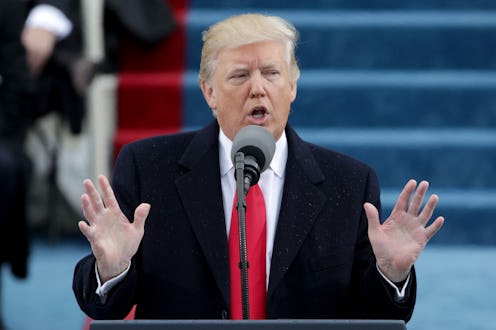News
Stop Speculating About Trump's Mental Health

Since he first made clear to the world that he had his eye on the White House, now-president Donald Trump has been called every variation on "crazy" that there is, including but not limited to "insane," "bonkers," "off his rocker," and "out of his mind." It's not hard to understand why. He has been the nation's commander-in-chief for less than a month, but has already pushed ahead with policies making life harder for millions of Americans and those who hope to be Americans someday. Trump's moves have people looking for a way to explain them, and observers like Andrew Sullivan argue that we should be discussing whether Trump is mentally healthy. We shouldn't. Shifting the focus to Trump's mental health not only further marginalizes people living with mental illness, it keeps us from calling him out for what he really is. I'd argue that what we should discuss instead is that Trump is an authoritarian bigot.
Let's look at the facts: Trump has already pushed ahead with his campaign promises to make it harder for refugees and Mexican immigrants to find a new home in America. He has placed undue burdens on already-marginalized Americans through his promises to repeal Obamacare and appoint an anti-choice justice to the Supreme Court. He has taken credit for the latest wave of ICE raids that are tearing families across the country apart. His administration is reportedly looking at drafts of an executive order that could effectively legalize private businesses' discrimination against LGBTQ individuals. And that's just since Inauguration Day.
Let's not forget how, during his campaign, he called Mexicans "rapists," repeatedly demeaned women, and proposed bringing stop and frisk — a program that violated the civil rights of African Americans and Latinos in New York City — nationwide (amongst so many other incidents). These actions are not symptoms of a mental illness. They are the result of a worldview that prioritizes some lives over others, that values maintaining power over compassion, and that — in Trump's world — has been unchallenged over a lifetime and then rewarded with the most powerful position in the world.
Some observers have pointed to Trump's inflated sense of self and penchant for lying as evidence that he is in desperate need of a mental health exam. But in a society structured as ours, I'd counter-argue that he is just one of a great number of self-important white men. And he is hardly the first politician to lie. What sets him apart is he is unapologetic about it all — about the lies, the disrespect, even about being sued by the justice department for racial discrimination in the 1970s — and indeed it's that quality that attracted many voters to him on Election Day. If Trump were more humble, more charming, would we be able to focus on his blatant bigotry only then?
The focus on Trump's mental health is more of a way to distance Trump from the nation that elected him. If Americans really want to talk about mental health, that discussion needs to include everything from lack of access to care to stigmatization of illness. When we talk about Trump, let's remember he is an adult man with every resource and privilege at his disposal. And when we talk about what's wrong with him, let's remember the parts of our society — white supremacy, sexism, disregard of the working class — that allowed him to come to power.
It's easy to call Trump crazy. It's much harder, but ultimately much more worthwhile, to name what he's doing and open our eyes to the bigotry and disenfranchisement that have been around us since before Trump ever said, "You're fired." You may think Trump is "crazy," but don't let that keep from holding him responsible for his choices and actions.